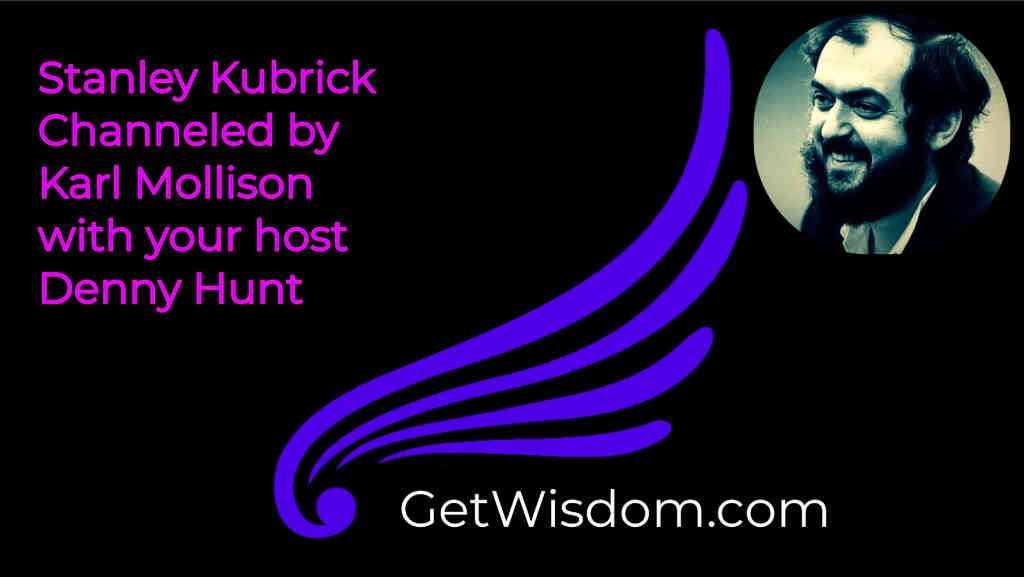
Stanley Kubrick Channeled by Karl Mollison 05June2018
Adapted from https://en.wikipedia.org/wiki/Stanley_Kubrick
Stanley Kubrick (July 26, 1928 – March 7, 1999)
Stanley was an American film director, screenwriter, and producer. He is frequently cited as one of the greatest and most influential directors in cinematic history. His films, which are mostly adaptations of novels or short stories, cover a wide range of genres, and are noted for their realism, dark humor, unique cinematography, extensive set designs, and evocative use of music.
Kubrick was raised in the Bronx, New York City. He was not fond of school and was an accomplished chess player in his youth. He was very interested in photography and that passion became his vehicle for learning and problem solving.
After working as a photographer for Look magazine in the late 1940s and early 1950s, he began making short films on a shoestring budget, and made his first major Hollywood film, The Killing, for United Artists in 1956. This was followed by two collaborations with Kirk Douglas, the war picture Paths of Glory (1957) and the historical epic Spartacus (1960).
His reputation as a filmmaker in Hollywood grew, and he was approached by Marlon Brando to film what would become One-Eyed Jacks (1961), though Brando eventually decided to direct it himself.
Creative differences arising from his work with Douglas and the film studios, a dislike of the Hollywood industry. Kubrick to move to the United Kingdom in 1961, where he spent most of the remainder of his life and career. His home at Childwickbury Manor in Hertfordshire, which he shared with his wife Christiane, became his workplace, where he did his writing, research, editing, and management of production details. This allowed him to have almost complete artistic control over his films, but with the rare advantage of having financial support from major Hollywood studios. His first British productions were two films with Peter Sellers, Lolita (1962) and Dr. Strangelove (1964).
He was a demanding perfectionist, Kubrick assumed control over most aspects of the filmmaking process, from direction and writing to editing, and took painstaking care with researching his films and staging scenes, working in close coordination with his actors and other collaborators. After a film he would typically drop the close relationships formed with his actors and other collaborators.
Many of Kubrick’s films broke new ground in cinematography. The scientific realism and innovative special effects of 2001: A Space Odyssey (1968) were without precedent in the history of cinema, and the film earned him his only personal Oscar, for Best Visual Effects. Steven Spielberg has referred to the film as his generation’s “big bang”, and it is regarded as one of the greatest films ever made.
For the 18th-century period film Barry Lyndon (1975), Kubrick obtained lenses developed by Zeiss for NASA, to film scenes under natural candlelight. With The Shining (1980), he became one of the first directors to make use of a Steadicam for stabilized and fluid tracking shots. While many of Kubrick’s films were controversial and initially received mixed reviews upon release—particularly A Clockwork Orange (1971), which Kubrick pulled from circulation in the UK following a mass media frenzy—most were nominated for Oscars, Golden Globes, or BAFTA Awards, and underwent critical re-evaluations. His last film, Eyes Wide Shut, was completed shortly before his death in 1999 at the age of 70.
Some find him a completely enigmatic figure in terms of his actual occult knowledge, his life’s purpose expressed in his art and the social commentary therein and the dichotomy between his personal and professional lives. For an insider’s view, you would do well to read what Michael Herr writes in his book “Kubrick.”
What Kubrick tells us from the Light is both foreboding and inspiring.
Questions for Light Being Stanley Kubrick 05June2018
1) Why did you become an earthbound spirit?
2) Was the video of your confession regarding the Apollo moon landing a fake? Were the Apollo moon landings faked? All of them or some of them? Were you involved?
3) Can you tell us about your esoteric resources that were used in your films? Which one of your films portrays the full force of your esoteric knowledge?
4) What was your understanding of evil and did you feel that you understood its reason and cause?
5) In what way, if any, did your movie A Clockwork Orange serve the Light? Could it be viewed as a warning?
6) Did you have any lost soul spirit attachments in your incarnation and can you tell us about this as it may have influenced your art?
7) Can you explain your interest and affinity for Napoleon and the Final Solution, two subjects where you may have had some intentions to make a film for each?
8) Would it be realistic to view the AI movie that you made with Steven Spielberg, starring Haley Joel Osment as an android, masquerading as a young boy, as a mind programming tool to soften up the world’s human population to the idea of machine love being equitable to Divine Love? Or is this overreaching?
9) Was your death due to natural causes?
10) What do you think about the investment in the human free will experiment and its meaning going forward if humans are successful in this alleged 9 year period of transition?
